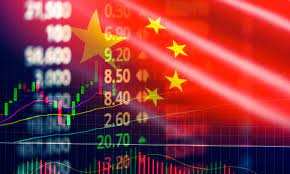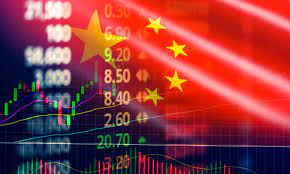
A slow down in export growth of the Chinese economy was noted for January-February period, owing to base effects, and while the statistics exceeded forecasts, Russia's invasion of Ukraine has raised concerns about the global trade picture this year.
Official statistics released on Monday showed that outbound exports increased 16.3 per cent in the first two months of the year compared to the same time a year ago, exceeding expert predictions of a 15.0 percent increase but falling short of the 20.9 percent increase seen in December.
Imports rose 15.5 per cent, slowing from a 19.5 per cent growth in December and falling short of the forecasted 16.5 percent rise.
To level out distortions created by the Lunar New Year, which might fall in any month, the customs department provides combined January and February trade figures.
Factory activity typically slows during the extended holiday season as employees return to their hometowns. However, many manufacturing employees did not return home for the third year in succession due to fears over Covid-19, which kept several plants open.
"These numbers will probably be well received. China's exports are high and also the imports are continuing," said Louis Kuijs, Asia Pacific chief economist at S&P Global Ratings, and added that exports continue to be an element of the Chinese economy that is still supporting overall economic growth.
"We need to see how long the economic impact (from the Ukraine crisis) will last. China's economy overall is big and should be to able to continue to grow even in the face of external shocks but export growth will be affected."
For much of last year, China's soaring exports surpassed predictions and boosted growth in the world's second-largest economy, but economists anticipate shipments to drop as international demand for goods declines and exporters face rising prices.
Russia's "special operation" invasion of Ukraine which started on February 24, as well as growing international sanctions against Moscow, have both generated new threats for the global economy, compounding months of stress for China's manufacturers due to global supply chain problems.
The crisis in Ukraine, according to Tian Yun, former deputy director of the Beijing Economic Operation Association, might affect China-Europe commerce.
"If the Ukraine crisis halts China-EU freight train services or leads to a slower operation efficiency, there will be adverse impact to EU and China's trade. This might be the biggest risk," Tian said.
According to factory executives and analysts, Chinese exporters with exposure to Ukrainian markets have postponed shipments, while other manufacturers with business in Russia have been waiting for payment from their clients before scheduling the next shipments. find out more
According to customs statistics released on Monday, China's exports to Russia increased 41.5 per cent in the first two months of the year, outpacing growth in other nations, while imports from Russia increased 35.8 per cent.
Despite rising energy costs caused by the Ukraine conflict, Lian Weiliang, a deputy head at the National Development and Reform Commission, anticipates overall cost difficulties for importers to remain manageable.
"The source of China's crude oil and natural gas imports is diverse, with long-term contracts accounting for a large proportion of all deals," Lian said at a news conference. "As long as all parties comply with the contracts, imports can remain stable."
Higher energy and agricultural product prices, according to analysts, would raise the country's import value in the coming months.
"As domestic infrastructure investment kicks in, the demand for energy commodities will continue to expand," said Chang Ran, senior researcher at Zhixin Investment Research Institute.
"The Russia-Ukraine conflict may cause prices of crude oil, natural gas, wheat, and others to soar for a period of time. The price factor could bolster imports."
In the face of an uncertain global recovery and a slump in the country's enormous property sector, Beijing has set a reduced growth target of roughly 5.5 per cent for this year. While this would represent a significant decrease in yearly growth, economists believe it is still an ambitious goal that would require greater policy assistance.
(Source:www.reuters.com)
Official statistics released on Monday showed that outbound exports increased 16.3 per cent in the first two months of the year compared to the same time a year ago, exceeding expert predictions of a 15.0 percent increase but falling short of the 20.9 percent increase seen in December.
Imports rose 15.5 per cent, slowing from a 19.5 per cent growth in December and falling short of the forecasted 16.5 percent rise.
To level out distortions created by the Lunar New Year, which might fall in any month, the customs department provides combined January and February trade figures.
Factory activity typically slows during the extended holiday season as employees return to their hometowns. However, many manufacturing employees did not return home for the third year in succession due to fears over Covid-19, which kept several plants open.
"These numbers will probably be well received. China's exports are high and also the imports are continuing," said Louis Kuijs, Asia Pacific chief economist at S&P Global Ratings, and added that exports continue to be an element of the Chinese economy that is still supporting overall economic growth.
"We need to see how long the economic impact (from the Ukraine crisis) will last. China's economy overall is big and should be to able to continue to grow even in the face of external shocks but export growth will be affected."
For much of last year, China's soaring exports surpassed predictions and boosted growth in the world's second-largest economy, but economists anticipate shipments to drop as international demand for goods declines and exporters face rising prices.
Russia's "special operation" invasion of Ukraine which started on February 24, as well as growing international sanctions against Moscow, have both generated new threats for the global economy, compounding months of stress for China's manufacturers due to global supply chain problems.
The crisis in Ukraine, according to Tian Yun, former deputy director of the Beijing Economic Operation Association, might affect China-Europe commerce.
"If the Ukraine crisis halts China-EU freight train services or leads to a slower operation efficiency, there will be adverse impact to EU and China's trade. This might be the biggest risk," Tian said.
According to factory executives and analysts, Chinese exporters with exposure to Ukrainian markets have postponed shipments, while other manufacturers with business in Russia have been waiting for payment from their clients before scheduling the next shipments. find out more
According to customs statistics released on Monday, China's exports to Russia increased 41.5 per cent in the first two months of the year, outpacing growth in other nations, while imports from Russia increased 35.8 per cent.
Despite rising energy costs caused by the Ukraine conflict, Lian Weiliang, a deputy head at the National Development and Reform Commission, anticipates overall cost difficulties for importers to remain manageable.
"The source of China's crude oil and natural gas imports is diverse, with long-term contracts accounting for a large proportion of all deals," Lian said at a news conference. "As long as all parties comply with the contracts, imports can remain stable."
Higher energy and agricultural product prices, according to analysts, would raise the country's import value in the coming months.
"As domestic infrastructure investment kicks in, the demand for energy commodities will continue to expand," said Chang Ran, senior researcher at Zhixin Investment Research Institute.
"The Russia-Ukraine conflict may cause prices of crude oil, natural gas, wheat, and others to soar for a period of time. The price factor could bolster imports."
In the face of an uncertain global recovery and a slump in the country's enormous property sector, Beijing has set a reduced growth target of roughly 5.5 per cent for this year. While this would represent a significant decrease in yearly growth, economists believe it is still an ambitious goal that would require greater policy assistance.
(Source:www.reuters.com)














